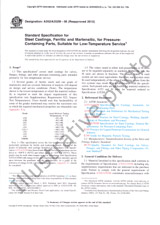We need your consent to use the individual data so that you can see information about your interests, among other things. Click "OK" to give your consent.
ASTM D6514-03(2019)e1
Standard Test Method for High Temperature Universal Oxidation Test for Turbine Oils (Includes all amendments and changes 2/14/2020).
Translate name
STANDARD published on 1.5.2019
The information about the standard:
Designation standards: ASTM D6514-03(2019)e1
Publication date standards: 1.5.2019
SKU: NS-983924
The number of pages: 7
Approximate weight : 21 g (0.05 lbs)
Country: American technical standard
Category: Technical standards ASTM
The category - similar standards:
Annotation of standard text ASTM D6514-03(2019)e1 :
Keywords:
high temperature fluid stability test, oils´lubricating, oxidation stability, turbine oil, universal oxidation test,, ICS Number Code 27.060.10 (Liquid and solid fuel burners)
These adjuncts apply to this standard:
Adjunct to D6514, Standard Test Method for High Temperature Universal Oxidation Test for Turbine Oils
Selected format:Show all technical information.
Additional information
| Significance and Use | ||||||||||||||||||||||||||
|
5.1 Degradation of fluid lubricants because of oxidation or thermal breakdown can result in fluid thickening or in the formation of acids or insoluble solids and render the fluid unfit for further use as a lubricant. 5.2 This test method can be used for estimating the oxidation stability of oils. It can function as a formulation screening tool, specification requirement, quality control measurement, or as a means of estimating remaining service life. It shall be recognized, however, that correlation between results of this test method and the oxidation stability of an oil in field service can vary markedly with field service conditions and with various oils. 5.3 This test method is designed to compliment Test Method D5846 and is intended for evaluation of fluids which do not degrade significantly within a reasonable period of time at 135 °C. |
||||||||||||||||||||||||||
| 1. Scope | ||||||||||||||||||||||||||
|
1.1 This test method covers a procedure for evaluating the oxidation of inhibited lubricants in the presence of air, copper, and iron metals. 1.2 This test method was developed and is used to evaluate the high temperature oxidation stability and deposit forming tendency of oils for steam and gas turbines. It has been used for testing other lubricants made with mineral oil and synthetic basestocks for compressors, hydraulic pumps, and other applications, but these have not been used in cooperative testing. 1.3 The values stated in SI units are to be regarded as standard. No other units of measurement are included in this standard. 1.4 This standard does not purport to address all of the safety concerns, if any, associated with its use. It is the responsibility of the user of this standard to establish appropriate safety, health, and environmental practices and determine the applicability of regulatory limitations prior to use. 1.5 This international standard was developed in accordance with internationally recognized principles on standardization established in the Decision on Principles for the Development of International Standards, Guides and Recommendations issued by the World Trade Organization Technical Barriers to Trade (TBT) Committee. |
||||||||||||||||||||||||||
| 2. Referenced Documents | ||||||||||||||||||||||||||
|
We recommend:
Technical standards updating
Do you want to make sure you use only the valid technical standards?
We can offer you a solution which will provide you a monthly overview concerning the updating of standards which you use.
Would you like to know more? Look at this page.





 Cookies
Cookies
